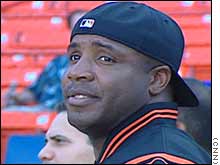 |
| Barry Bonds and his home run chase are on hold so far this season, but it hasn't hurt baseball's overall popularity. |
|
|
|
|
|
|
|
NEW YORK (CNN/Money) -
Will baseball fans be going, going gone, if steroid-aided home runs disappear from the game?
It's accepted wisdom in baseball that home runs, and home run hitters, "put fannies in the seats." Yankee Stadium is still called "the House that Ruth Built" more than 70 years after the slugger's last game.
It's also commonly accepted that it was the 1998 homer race between Mark McGwire and Sammy Sosa that helped baseball recover from popularity lost during the 1994-95 work stoppage.
Those cliches would lead you to believe that baseball's box office and bottom line got a boost from steroids-aided power surge of the last decade or so.
With tougher testing and penalties for steroid use by players now in place, it would suggest that home runs and fan interest are both going to suffer going forward.
In fact, homers are down a touch -- about 5.5 percent in the games leading up to the All Star break. Whether that has anything to do with steroid testing, I'll leave to others to debate.
But neither ticket demand nor television ratings will suddenly swoon just because of a drop off in homers. The fact is, the love affair with the long ball is as overstated as the distance of a tape-measure shot.
First of all, a 5 percent drop in home runs is almost too small to notice.
There have been about 2.04 home runs per game so far this year, compared to 2.16 during the same period of 2004.
A devoted fan who goes to 20 games a season would therefore see 41 rather than 43 homers during the course of this year, on average. Even a 10 percent drop in home runs would mean the same 20-game fan would see just 4 fewer homers.
Strict statistical analysis comparing fan interest and home runs is difficult, if for no other reason than the fact that teams hitting a lot of home runs often win lots of games.
There's no doubt that winning teams attract more fans. But there's plenty of anecdotal evidence that the home runs are one of the less important aspects of filling the stands.
Since the American League adopted the designated hitter rule in 1973, the league has had more home runs per game than the National League every season but two. But in 25 of those 32 seasons, the American League has had lower attendance per game than the National League.
There are also plenty of examples of teams that shave the number of home runs and draw more fans and viewers because they actually are more successful on the field.
Perhaps the most dramatic is the Seattle Mariners, which lost power-hitting star Alex Rodriguez to free agency after the 2000 season, and signed singles hitter Ichiro Suzuki.
The team's homers fell 15 percent in 2001, but it won a record 116 games that season. With the wins came record television ratings other teams would kill for, along with league-leading attendance.
If a star player is making an assault on a home run record, it's likely to draw more fans, especially on the road when that star is making a rare appearance.
The fact that San Francisco Giant slugger Barry Bonds has been injured has hurt demand for Giants tickets.
Still, the Giants' paid attendance at home is off just less than 3 percent, at least partly because of a strong base of season-ticket holders and pre-season sales. Giants television ratings have taken a greater hit than the box office, down about 40 percent.
But the Giants falling well under .500 and out of the playoff hunt probably hurt as much or more than Bonds' absence, said Mike Janes, senior vice president of marketing for San Francisco-based StubHub.com, an online ticket marketplace.
"My gut is that sales would be up if the Giants were in the race, even without Bonds," he said.
Giants' home ticket sales slipped less than 2 percent between 2001, when Bonds set the single-season home run record, and 2002, when the team went to the World Series.
But their television ratings actually went up in 2002, according to a spokesman for Fox Sports Net, which carries the team's games. Bonds was still playing, but his home runs were not the driver of fan attention as in 2001; he didn't even lead the league.
"When teams are winning, their (ratings) are up, when they're losing, they're down," said network spokesman Tom Chiappetta. "Home runs don't really come into play."
For more on the business of sports, click here.

|